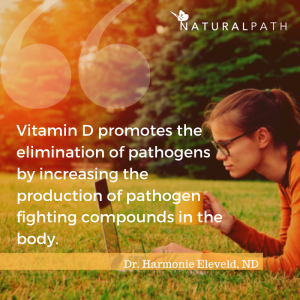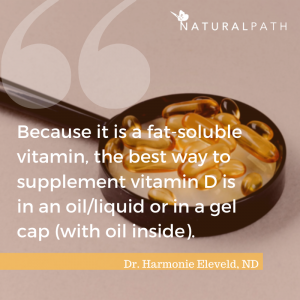Dr. Harmonie Eleveld, ND
Can Vitamin D supplements prevent COVID-19? The short answer is we don’t know yet because the research is still underway but the long answer is more complicated. We have increasing evidence that better vitamin D status and/or supplementation of vitamin D is possibly correlated to a decreased risk for contracting COVID-19 and possibly a decreased severity of infection.

Some background information on vitamin D
Vitamin D, or cacitriol, is a fat-soluble vitamin that we often know of as the “sunshine vitamin.” We create vitamin D in our skin by being outside in the sun and we can also get small amounts from some foods including fatty fish and eggs. Vitamin D is different from other vitamins in that it acts more like a hormone, meaning it carries chemical messages throughout the body.
Vitamin D is well understood to have far reaching health benefits. Its commonly cited benefit is its role in supporting healthy bones. Vitamin D assists in the hardening, growth and remodeling of bones and adequate levels have been shown to decrease risk of bone fractures. It has also been studied with respect to mental health, neurological health and cancer prevention.
For the purposes of this article, the most important health benefit of vitamin D is its role in immune system regulation. Vitamin D promotes the elimination of pathogens by increasing the production of pathogen fighting compounds in the body [1-3]. There are many strong studies showing that lower vitamin D levels in the blood increase a person’s risk for contracting an acute respiratory tract infection [4,5]. There are even studies on pregnant women showing that if their blood levels are higher in vitamin D during pregnancy, there is less chance their babies will develop an acute respiratory tract infection [6]. We also have meta-analyses (meaning studies of groups of randomized controlled trials) which show that supplementing vitamin D decreases the risk of developing a respiratory infection, especially in those with very low levels [7].
Don’t think because you’re frequently outside that you won’t need extra vitamin D
Unfortunately, due to the higher latitude in Canada, and therefore lower angle of the sun, the actual intensity of the sunshine we get is low and therefore our bodies’ ability to make vitamin D from this sunshine is also low. So, despite spending a lot of time outside, even if you vacation down south for a few weeks, many Canadians still have very deficient or suboptimal vitamin D levels.
I see this in my practice all the time!
I test vitamin D in almost all of my patients and have yet to come across an optimal vitamin D level without significant supplementation. The optimal value I look for in my patients is between 135nmol/L and 150nmol/L. If you manage to have a vitamin D level above 75nmol/L, much of the research supports this level as having the majority of the benefits for your bones, so you will decrease your fracture risk. However, if you are able to get your vitamin D higher and closer to 135nmol/L, the additional benefits include reducing the risk of: all cancers [8], Type 1 Diabetes [9], having a heart attack [10] and developing Multiple Sclerosis [11] among others.
The lowest value I have seen in my practice is 23nmol/L. One of the problems I see is that many people could be walking around with levels this low, and you wouldn’t know unless you tested. The patient I saw with this level did not have any obvious symptoms indicative of low vitamin D and so it could have gone undetected for a long time. A value this low can take 6-12 months to bring up to optimal values using appropriate prescription dosing.
Are you at higher risk of having poor vitamin D status?
The most at risk populations for having low vitamin D levels are the elderly, those that live in areas of the highest latitude, those who wear clothing that would inhibit sun exposure, as well as people of color. Vitamin D levels decrease generally as we age and your levels might have been good in your 30s, but could be significantly low in your 60s. Additionally, for people of color, the melanin in skin partially blocks the skin’s ability to create vitamin D from the sun and so, in Canada, with our lower light intensity, if you have a darker skin tone you may need additional supplementation.
My general recommendations on supplementing vitamin D

I generally recommend a daily amount of supplemental vitamin D of 1000 IU for adults, 800 IU for children, and 400 IU for infants. This amount can be taken without a prescription or blood testing but unfortunately is often not enough. Any more than 1000 IU per day is a prescription dose and should only be taken if followed by a practitioner that can run your vitamin D blood test every 6-12 months to ensure your blood levels don’t get too high.
Vitamin D is fat soluble. This means that we can store it in our bodies. Because of this, if we take too much for too long, we can build up our levels to toxic amounts and can cause hypercalcemia (too much calcium in the blood), bone damage, and kidney damage. This is why it is so important to have your levels tested by your Naturopathic Doctor or family physician.
There are two common supplement forms of vitamin D: D2 and D3. You want to make sure you get D3 as this will be much better absorbed. Also, because it is a fat-soluble vitamin, the best way to supplement vitamin D is via oil/liquid or in a gel cap (with oil inside). Absorption is still possible in tablet form, but try to take it with a fatty meal for better immersion.
Ok, so what about COVID-19?
As discussed above, vitamin D is very important for immune health and it appears this may play out with respect to COVID-19 as well. There have been several studies pointing to this correlation. In a study conducted across Europe, as well as a study conducted in Switzerland, a lower vitamin D blood level was associated with a higher incidence of positive COVID-19 tests as well as higher COVID-19 mortality [12, 13]. Also, in a study conducted across 3 south Asian hospitals, there were significantly lower vitamin D levels in those patients who died from COVID-19 versus those that survived [14]. As mentioned above, we have numerous studies and meta-analysis showing that better vitamin D blood levels and supplementation decreases the incidence of acute upper respiratory tract infections as well as infection severity. However, what we do not have is randomized controlled studies of supplementation in order to prove a causative relationship with preventing COVID-10.
So again, do we know that supplementing vitamin D can prevent COVID-19?
No, we cannot conclusively say this because we will need some higher-level studies (i.e. double blind, placebo-controlled studies) to conclusively give us this answer. However, given the low cost, the many other additional benefits and the safety of supplementing vitamin D, when used appropriately and with the guidance of your ND, there is a strong case to be testing and supplementing with vitamin D for everyone right now. Although this was already the case prior to COVID-19! Additionally, it will not hurt to spend some more time outside (safely)!
References:
- https://pubmed.ncbi.nlm.nih.gov/24755435/
- https://pubmed.ncbi.nlm.nih.gov/27838350/
- https://onlinelibrary.wiley.com/doi/abs/10.1002/rmv.1909
- https://pubmed.ncbi.nlm.nih.gov/31438516/?from_term=Acute+Respiratory+Tract+Infection+AND+Vitamin+D&from_pos=6
- https://www.ncbi.nlm.nih.gov/pmc/articles/PMC5310969/
- https://pubmed.ncbi.nlm.nih.gov/29444346/
- https://www.bmj.com/content/356/bmj.i6583
- https://academic.oup.com/ajcn/article/85/6/1586/4633053
- https://www.sciencedirect.com/science/article/pii/S0140673601065801
- https://pubmed.ncbi.nlm.nih.gov/18541825/
- https://pubmed.ncbi.nlm.nih.gov/17179460/
- https://link.springer.com/article/10.1007/s40520-020-01570-8
- https://pubmed.ncbi.nlm.nih.gov/32397511/
- https://papers.ssrn.com/sol3/papers.cfm?abstract_id=3571484
Disclaimer: This article is meant for general informational purposes only. You should always consult a healthcare provider prior to making any changes in your medication or supplement regime.

“Dr. Harmonie Eleveld is a Naturopathic Doctor, clinic owner, wife and dog parent. In 2013 she opened Natural Choice Medical Clinic, an integrative health clinic in Guelph, Ontario. Dr Eleveld received her naturopathic training at the Canadian College of Naturopathic Medicine. She is a registered member with the College of Naturopaths of Ontario and has been qualified for the additional standards of practice of therapeutic prescribing and intravenous infusion therapy. She is also a participating member of the Ontario Association of Naturopathic Doctors (OAND) and the Canadian Association of Naturopathic Doctors (CAND). After several years in practice, Dr Eleveld honed in on her true calling of aiding women in mid-life. She educates women about perimenopause and menopause, advising them that they do not have to live with the discomforts of hormonal imbalance; such as: hot flashes, insomnia, heavy periods, fibroids, joint pain, mood swings, fluid retention, anxiety, hair loss and fatigue. She helps her patients live vibrantly during and after menopause because a high quality of life, for your whole life, is of great importance. Dr. Eleveld spends her spare time playing ball hockey, baseball, volleyball, walking the dog, hiking, attending book club or relaxing with a nice glass of wine watching the game with her husband Kevin. You can find her on social media at Facebook: @Naturalchoicemedicalclinic; Instagram: @Naturalchoicemedicalclinic or visit her website for more information at www.naturalchoicemedicalclinic.com
